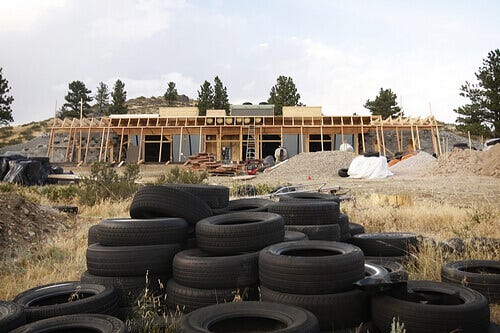Top 10 Skills Needed To Go Off-Grid
Deciding to embrace an off-grid lifestyle is both an exciting adventure and a significant commitment. Living off the land and relying on your own resources means gaining a variety of skills to thrive in a self-sufficient environment. Whether you’re planning to build your cabin, grow your food, or simply want to be more connected with nature, mastering these essential skills will help you on your journey to becoming off-grid!
1. Self-Sufficient Gardening
Growing your own food is a cornerstone of off-grid living. Understanding how to cultivate a garden will ensure you have fresh produce all year round.
Tip: Start small! Grow easy-to-manage crops like tomatoes, lettuce, or herbs, and gradually expand your garden as you gain confidence.
2. Basic Construction Skills
Whether you’re building your cabin or creating storage sheds, having basic construction skills is invaluable. This includes understanding how to use tools, measure accurately, and follow blueprints.
Tip: If you’re new to construction, consider taking a local workshop or using online resources to learn fundamental techniques.
3. Emergency Preparedness
Being off-grid means being prepared for the unexpected. Understanding first aid, basic survival skills, and emergency response is crucial in times of need.
Tip: Take a first aid and CPR course. Equip your cabin with a well-stocked emergency kit containing the necessary supplies and manuals.
4. Water Management
Understanding how to source, filter, and store water is essential for any off-grid lifestyle. Knowledge of rainwater harvesting and well-maintenance can significantly impact your self-sufficiency.
Tip: Research water filtration systems to ensure you have access to clean drinking water at all times.
5. Food Preservation Techniques
Once you have grown or foraged your food, knowing how to preserve it can make a significant difference. Skills in canning, dehydrating, and fermenting help ensure your supplies last.
Tip: Start with simple methods such as freezing or drying fruits and vegetables before progressing to canning and fermenting.
6. Animal Husbandry
If you plan to keep animals for food or companionship, learning the basics of animal care is essential. This includes understanding their dietary needs, health care, and housing requirements.
Tip: Raise a few chickens for eggs or start with a small goat, as these animals are often easier to care for and can provide valuable resources.
7. Knowledge of Renewable Energy Sources
As an off-grid dweller, you’ll likely want to harness renewable energy sources, such as solar or wind power. Learning how to install and maintain these systems is key to achieving energy independence.
Tip: Explore local workshops or online courses about solar panel installation to get started and understand how to optimize energy use.
8. Hunting and Foraging Skills
Understanding how to find and identify wild edible plants, as well as hunting for local wildlife, can supplement your food supply and educate you about local ecosystems.
Tip: Join local foraging groups or consult field guides to learn from experienced foragers and expand your knowledge safely.
9. Basic Mechanical Repairs
Living off-grid may require you to perform basic mechanical repairs on vehicles, machinery, or tools. Knowing how to fix or maintain equipment will save both time and money.
Tip: Invest in a repair manual for your tools and vehicles, or consider taking a mechanics class to build your confidence.
10. Adaptability and Problem-Solving
Perhaps one of the most crucial skills needed for off-grid living is adaptability. Embracing a flexible mindset allows you to face unexpected challenges with resilience.
Tip: Cultivate your problem-solving skills by tackling small challenges in your everyday life. This can help you approach off-grid living with a more prepared mindset.
Embarking on an off-grid journey requires dedication, learning, and a willingness to embrace simplicity. Developing these essential skills will help you not only thrive in a self-sufficient lifestyle but also enhance your connection with nature and foster a sense of empowerment.
As you venture into this rewarding way of life, remember to enjoy the process—every skill you acquire and challenge you face becomes part of your off-grid story.
Happy adventuring, and may your path lead you to new skills, freedom, and fulfilment!
Off-Grid Living Real-Life Case Studies
Curious about what life off the grid really looks like? You’re not alone! Many are inspired by the idea of escaping the hustle and bustle of city life to embrace a more sustainable, self-sufficient existence.
In this section, we’ll explore some real-life stories from individuals and families who have taken the leap into off-grid living. Their journeys are filled with valuable insights, practical lessons, and a dash of adventure!
Get ready to uncover the truths about living off-grid and see how these remarkable people navigate the challenges while celebrating the rewards of their unique lifestyles.
Eric Mack: Living Off Grid in the New Mexico Desert.
Wren Everett: Off Grid in the Ozark Mountains

© Off-Grid Lifestyle Considerations: From Housing to Location to Social Life • Insteading
Source: https://insteading.com/blog/off-grid-lifestyle-considerations/
“Daisy Crocket”: Nikki van Schyndel
TheNordSkov: Off Grid In Sweden
Just a small selection of “real people” out there off-griding!
Where to Get the Resources to Be Resourceful
Living off-grid and embracing a sustainable lifestyle is an empowering choice, allowing you to cultivate self-sufficiency and live closer to nature. However, one of the biggest challenges many face on this journey is finding the right resources to support their endeavours. Whether you’re looking for materials, tools, or information, understanding where to source these resources can help you thrive in your off-grid adventure.
Let’s explore the best places to find the essentials you need to be resourceful in your sustainable living efforts.
1. Local Hardware Stores
Your local hardware store can be a goldmine of resources for anyone engaged in off-grid living. From tools to building materials, these shops often have what you need to maintain and enhance your living space.
Tip: Forge relationships with local staff. They can provide insights into the best products for your projects and may even have recommendations for bulk purchases or alternative solutions.
2. Second-hand shops and Flea Markets
Thrift stores, flea markets, and yard sales can be treasure troves for finding affordable tools, equipment, and supplies. Many people sell or donate items they no longer need, which can be perfect for your projects.
Tip: Be patient and persistent. Visit these places regularly, and reach out to your community to find out when local sales or markets are happening.
3. Online Classifieds and Marketplaces
Websites such as Craigslist, Facebook Marketplace, and OfferUp can provide a wealth of low-cost resources. You can often find tools, building materials, or even furniture at a fraction of the retail price.
Tip: Set up alerts for specific categories—this way, you can act quickly when a resource or item is posted that fits your needs.
4. Recycling Centres and Salvage Yards
Salvage yards or construction recycling centres are ideal for sourcing materials at a low cost. These places often have reclaimed wood, metal, and other materials that can be creatively used in your off-grid projects.
Tip: Don’t be afraid to negotiate prices, especially for larger bulk purchases. Also, be sure to verify the condition of the materials, as they may require some additional work before use.
5. Community Workshops and Maker Spaces
Check whether your area has community workshops or maker spaces. These facilities often offer workshops and classes where you can learn various skills pertinent to off-grid living, such as woodworking, gardening, and DIY home repairs.
Tip: Engage with local groups or clubs focused on sustainable living, gardening, or building. You may find workshops that not only provide resources but also foster connections with like-minded individuals.
6. Local Co-ops and CSA Programs
Community-supported agriculture (CSA) programs and local co-ops often offer access to sustainable resources. You can source fresh, organic produce, as well as garden supplies, seeds, and sometimes even tools for off-grid gardening.
Tip: Getting involved with a local CSA can also lead to opportunities to learn from farmers and other community members who can share their knowledge and experiences.
7. DIY and Gardening Blogs
The internet is filled with a plethora of resources from blogs and websites dedicated to off-grid living, DIY projects, and sustainable practices. These platforms often share downloadable resources, guides, and tutorials to equip you with the knowledge needed to enhance your lifestyle.
Tip: Bookmark your favourite blogs and consider subscribing to their newsletters for continuous inspiration and resource updates!
8. Books and Educational Materials
Visit your local library or bookstore to find books on off-grid living, sustainability, and self-sufficiency. Many authors share practical knowledge and personal experiences that can provide valuable insights.
Tip: Consider investing in eBooks or audiobooks on sustainable living topics; they can be easily accessed from anywhere and often come with additional resources or communities for support.
9. YouTube Channels
YouTube is an excellent source for visual learners. Countless channels are dedicated to off-grid living, DIY projects, homesteading, and sustainable practices. These videos can provide step-by-step tutorials that make complex projects easier.
Tip: Follow channels with content that resonates with you, and subscribe for notifications on new videos. Engaging with comments can also foster learning and community.
10. Connect with Local Off-Grid Communities
Finally, seek out local off-grid communities, either through social media groups or in-person meet-ups. Networking with others can reveal hidden resources, tools, and tips on where to find materials, share skills, and collaborate.
Tip: Attend local workshops, potlucks, or community events to create relationships that can lead to resource sharing and support networks.
Becoming resourceful in your off-grid lifestyle involves proactive sourcing of materials, knowledge, and community connections. By exploring these resources—from local shops to online platforms—you can equip yourself with everything you need to thrive sustainably.
Embrace the journey toward self-sufficiency, and remember that it's not just about finding the right resources; it’s about building a community that supports one another in creating the life they desire.
Happy sourcing, and may your off-grid adventure be filled with creativity and resilience!
Some Interesting Podcasts for you:
Do YOU have a fave Off Grid, Sustainability, ECO niche podcast you follow? If so, please share and we can include them in our future issues:
And For Next Time:
“Low-Tech Homesteading Innovations”
“Cottage Industry Income Ideas”
“Mental Health Benefits of Off-Grid Living”
#STAYSAFE
PLEASE SHARE THIS NEWSLETTER FAR AND WIDE,
I intend to keep the subscription fully FREE for as long as possible!
Dominus Owen Markham - Your Man in a Cave in Rural Spain
Join me as a supporter and member with a real-life couple off-grid in Sweden:












